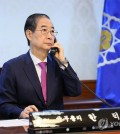- California Assembly OKs highest minimum wage in nation
- S. Korea unveils first graphic cigarette warnings
- US joins with South Korea, Japan in bid to deter North Korea
- LPGA golfer Chun In-gee finally back in action
- S. Korea won’t be top seed in final World Cup qualification round
- US men’s soccer misses 2nd straight Olympics
- US back on track in qualifying with 4-0 win over Guatemala
- High-intensity workout injuries spawn cottage industry
- CDC expands range of Zika mosquitoes into parts of Northeast
- Who knew? ‘The Walking Dead’ is helping families connect
National Assembly rejects special probe bill over Marine’s death in revote after Yoon’s veto
The National Assembly on Tuesday rejected a bill mandating a special counsel investigation into the military’s response to a Marine’s death last year that was up for a revote after President Yoon Suk Yeol’s veto.
The bill was voted down in a 179-111 vote with four abstentions and accordingly scrapped.
The bill, which was passed by the opposition-controlled parliament early this month and vetoed by Yoon, calls for the appointment of a special counsel to look into allegations Yoon’s office and the defense ministry inappropriately interfered in the military’s probe into the death of Cpl. Chae Su-geun, who was killed during a search mission for victims of heavy downpours in July 2023.
The ruling People Power Party (PPP) has opposed the bill, citing the need to first see the results of an ongoing investigation by the police and the Corruption Investigation Office for High-Ranking Officials.
For a bill to pass the National Assembly in a revote, it requires a majority of the 300-member parliament to be present and two-thirds of them to cast their ballots in favor.
The main opposition Democratic Party (DP), which won a resounding victory in last month’s general elections by sweeping 175 seats in the 300-member National Assembly, has said it will push to pass the bill in the upcoming 22nd National Assembly, set to kick off Thursday.
Speaking to reporters after the vote, DP leader Lee Jae-myung said he “finds it hard to understand why the PPP lawmakers are so vehemently opposed to uncovering the truth” about Chae, who sacrificed himself to protect the country.
“Members of the PPP have crushed the earnest will of the people, which I certainly find to be inappropriate action,” Lee said.
The National Assembly also passed a revised special bill aimed at assisting victims of a series of home rental scams. The legislation calls for the state to pay victims their deposits before recovering the money from the landlords.
The main opposition DP has pushed for the revision to provide victims with better support measures. But the ruling PPP has opposed it, arguing the state should not intervene in transactions between individuals.
PPP lawmakers boycotted the vote in protest. Yoon is likely to exercise his veto power.
“As the minister in charge, I will take all the responsible action,” Land Minister Park Sang-woo said at a press briefing after the bill was passed. “Once the revised special bill is transferred to the government, I will propose its reconsideration (under a provision) stipulated by the Constitution.”
PPP floor leader Choo Kyung-ho also vowed to consider suggesting the vetoes of four other bills that were railroaded by the DP.
The four others called for giving benefits to former pro-democracy activists who have not yet been designated people of national merit, extending medical cost assistance to victims of the Sewol ferry sinking by five years, supporting farmers of the premium “hanwoo” beef cattle and laying the legal foundation for the establishment of a representative group for farmers and fishermen.
“The bills that passed the plenary session today were passed without bipartisan agreement or social discussion, so we will consider actively proposing to the president that he exercise his (veto power),” Choo told reporters at the National Assembly.
The DP had also attempted to pass a pension reform plan during Tuesday’s plenary session, but failed to do so due to objections from the PPP.
The rival parties agreed on raising the premium from the current 9 percent to 13 percent of income, but diverged on the income replacement rate, or pension as a percentage of a subscriber’s average lifetime income.
The PPP insisted on an income replacement rate of 44 percent, up from the 40 percent set for 2028, while the DP accepted the PPP’s proposal.
But the PPP insisted more time and deliberation were needed to reform the country’s national pension scheme, which it said should include structural reforms and be carried out under the incoming National Assembly.











